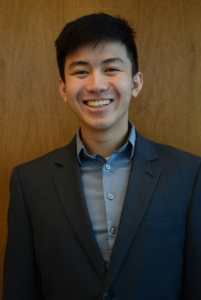News
Fellow Q&A: John Wang TF ’18
“Teaching is a powerful opportunity to shape the lives of the next generation”

WW Teaching Fellows come from many different backgrounds but are united by a single goal: to teach science, technology, engineering, and math (the STEM fields) in some of the nation’s highest-need schools. But what makes these Fellows tick? What inspired them to pursue a career in the classroom? In this WW Perspectives series, we hear from WW Teaching Fellows about what drew them to the program.
John Wang, a 2018 WW Georgia Teaching Fellow, shares with us the reason he chose to pursue a career in teaching, the challenges of teaching remotely as a result of the COVID-19 pandemic, the characteristics of an ideal WW Teaching Fellowship candidate, and more.
WW Teaching Fellowship: What drew you to teaching?
John Wang: I chose to teach because of a deep dissatisfaction with my own K–12 education. That dissatisfaction stemmed from an education system that was callous to students’ needs and students’ growth. I perceive teaching as a powerful opportunity to shape the lives of the next generation of individuals while also dismantling the system that led to my own deep dissatisfaction.
WW Teaching Fellowship: How would you describe the experience to someone who’s considering the WW Teaching Fellowship?
John Wang: Your development as a teacher accelerates during the clinical year. During that year, you learn approaches grounded in academic theories through both the master’s program and working directly with a mentor teacher. Furthermore, you have a group of peers who are equally passionate with whom you can collaborate and share resources to improve your teaching. While the experience may require significant time, attempting to balance a full-time master’s combined with full-time student teaching, you will come out of it fully prepared to be a strong teacher in the classroom. When I was hired as a teacher, there was already an existing reputation that WW Teaching Fellows are significantly stronger than average first-year teachers and well prepared to make a positive impact immediately.
WW Teaching Fellowship: In what ways has the WW Teaching Fellowship prepared you for unprecedented situations, such as distance learning due to a pandemic?
John Wang: While teaching during a pandemic was never in any assigned reading material, the most important preparation was learning the foundations of how to prepare strong lessons and likewise deliver them. For example, my training from my methods class allowed me to develop lessons that leveraged digital tools—like Desmos—to help students continue engaging with tasks that have them “doing mathematics” rather than the purely procedural/packet work that other school districts sent out.
WW Teaching Fellowship: What has been the biggest challenge of distance learning?
John Wang: The biggest challenge of distance learning was the digital inequity that became especially apparent. While students’ home backgrounds are not as obvious when in school, the lack of computers and internet posed a clear obstacle in preventing students from learning. My school district did take steps to deliver laptops and hotspots. However, gaps still exist.
WW Teaching Fellowship: What has been the biggest success of distance learning?
John Wang: Learning at high levels is possible in a distance learning environment!
WW Teaching Fellowship: In your opinion, for what kind of candidate is the WW Teaching Fellowship ideal?
John Wang: An individual who is persistent. Teaching can feel daunting at first, given how much there is to learn to become a strong teacher. However, an individual who is willing and able to persist, in spite of all possible setbacks, would succeed in the WW Teaching Fellowship and teaching in general.
WW Teaching Fellowship: What is the most important lesson about teaching that you have learned from your induction mentor?
John Wang: There’s always more work that can be done, so you need to learn to set boundaries early and work efficiently within the time that you have available.
WW Teaching Fellowship: Why was it important for you to teach in a high-need school? What makes teaching in a high-need school rewarding?
John Wang: The only way to truly begin addressing inequities embedded within our educational system is for strong teachers to be in high-needs schools.
WW Teaching Fellowship: Can you recall any moments in the classroom or school when you knew that you were making a difference as a teacher?
John Wang: The most salient moment was my contribution to supporting another immigrant student’s narrative. My student and I had a shared understanding of the importance of education gained only from seeing the sacrifices our parents made to get us access to these educational opportunities. She was willing to do whatever it took to be successful in school, and she thanked me for tutoring her every single morning and ensuring that she left each morning fully understanding the content. While I have no doubt that she would be successful regardless of which teacher she had, it was important to me that I played a role in helping her toward her future.
WW Teaching Fellowship: What advice do you have for those considering the WW Teaching Fellowship?
John Wang: The willingness to grow supersedes everything else. I had no expectation of coming in as an excellent teacher. In fact, I was afraid I was going to risk doing more harm than good. The clinical year allowed me the opportunity to take in as much as possible and learn enough to fully be capable of handling my own classroom by the time the clinical year ended.

